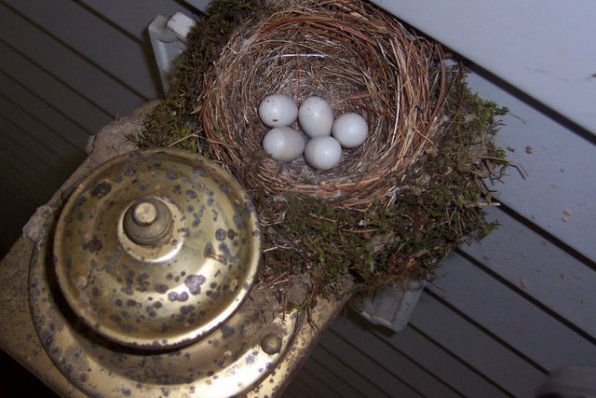By Paul Basham
For the Insider
Earlier this summer I watched a pair of small songbirds build a nest on the light fixture outside our front door. When one of the birds started sitting on the nest, I was sure there were eggs being incubated. After consulting my bird book, I learned that our new neighbors were warbling vireos, one of about 12 species of vireos native to North America. As the book suggested, the song of the bird helped me with the identification because I heard it singing from the tree tops. Its song is a cheery rambling warble with charming melodies that end on a rising note.
The bird's plumage is modest with an olive gray back, a dull white eyebrow and a whitish breast streaked with a faint yellow. Some might even call the bird drab. Both male and female are dressed alike. But it's the song of the bird that gives it distinction and, being found from coast to coast and from Alaska to Mexico, it is the most widely distributed vireo in North America before it migrates to the tropics during our winter.
Going in and out of our house, my wife and I were careful not to disturb the avian nursery. But one weekend we had a house full of company. My words of caution made little impact on the boisterous greetings, the excited noise of children, the banging of the door and the usual holiday pandemonium.
Several days after our guests had left and quiet was restored, I noticed that our warbling vireos had also mysteriously disappeared, taking their songs with them. The excitement and noise must have been too much for them. Later, when I was certain the vireos were not coming back, I used a ladder to look inside the nest. I saw five white eggs dotted with a few scattered brown specks.
Returning to my bird books, I checked on reasons why some birds abandon their nest of eggs. I learned that after locating a nest in what seemed like a safe place, changes can occur that pose a danger and threaten the bird's safety. For this reason a bird might consider it wise to abandon its nest even before the eggs are hatched.
But was it just the sudden noise and excitement that had caused our vireos to move elsewhere? Then I remembered. Our visiting guests had brought with them their large black cat that had stationed himself prominently outside our front door. My guess is that the presence of the cat made the birds nervous.
Mystery solved.









